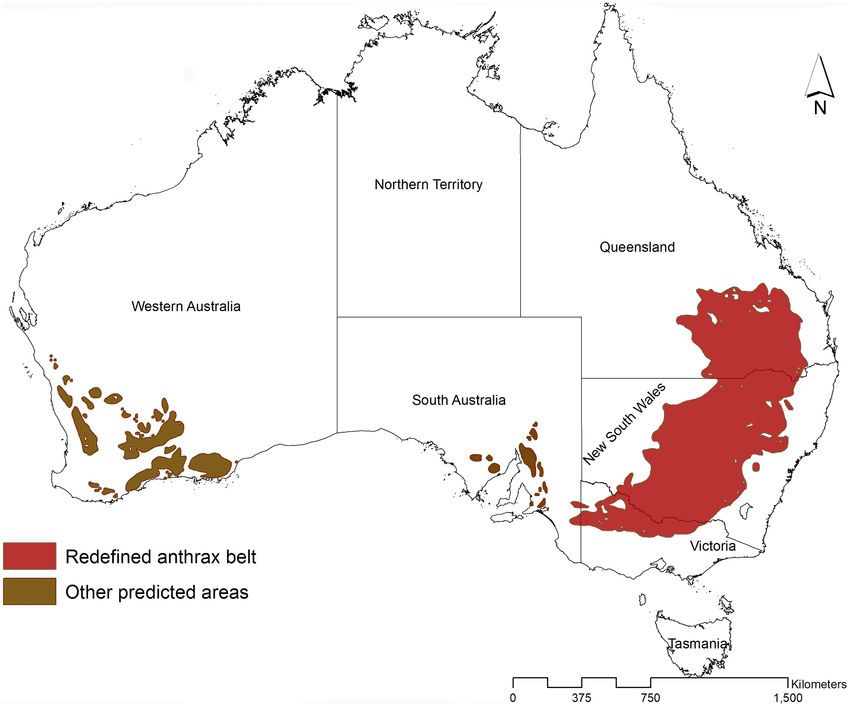
Anthrax belt map. Source – ResearchGate.
VICTORIA and Queensland are yet to follow New South Wales’ lead in urging statewide vaccinations against anthrax by livestock producers, despite heightened awareness of an increased infection risk nationally.
NSW’s Department of Primary Industries and Local Land Services this week encouraged farmers across the state to vaccinate their cattle and sheep against anthrax and suggested annual vaccination should be considered on high risk properties as spores can lie dormant in the soil for decades.
The latest proactive move by NSW authorities is believed to have been prompted by the continuing dry and dusty conditions, lack of ground cover and increased risk of infection from animals grazing close to the ground in sparse pasture conditions. Anthrax disease is caused by the bacterium Bacillus anthracis and affected stock often show few or no signs of ill health before they die, but soil contaminated with anthrax spores can be infective for decades.
Animal Health Australia said Australia’s anthrax vaccine bank is managed from Sydney by specialist animal health company, Virbac, which has stores of about 100,000 doses of the vaccine in case of a major outbreak of the disease.
Virbac Australia’s associate product manager – dairy, ruminant vaccines & fluke – David Yang said demand for anthrax vaccine fluctuates.
“At the moment I think people are more aware of the increased risk with drought, but I don’t see a pattern of increase (in vaccine demand).”
He said the concern of increased infection risk is coming from private and public veterinarians nationally.
Mr Yang said Virbac was monitoring demand for anthrax vaccine to enable production levels to react “at a faster rate should it be required.”
He has notified the company’s customer service team to expect and note any increase in calls from farmers or vets.
Department of Agriculture supports NSW move
Australia’s chief veterinary officer Dr Mark Schipp was unavailable for comment, but a Department of Agriculture spokesperson said the department supported NSW DPI’s initiative to encourage farmers in parts of NSW where anthrax has occurred in the past to vaccinate their animals. In Australia, anthrax mostly occurs in NSW, and into northern Victoria, the spokesperson said.
The department said that vaccination prevents anthrax from occurring by breaking the cycle of spore production. If vaccination is continued over time, spores in the environment will die, reducing the risk of anthrax occurring in the future.
Victoria’s Acting Chief Veterinary Officer Dr Cameron Bell said Agriculture Victoria prioritises and promotes early detection of anthrax cases.
“When livestock die suddenly and without an obvious cause, it must be reported immediately to a veterinary practitioner or to Agriculture Victoria animal health and welfare staff.”
“When anthrax is diagnosed, Agriculture Victoria staff identify properties that may be at risk of developing new cases of anthrax and work with the property managers to reduce this risk, including assessing vaccination as an option,” he said.
“As part of Agriculture Victoria’s anthrax preparedness program, owners/managers of properties in areas of Victoria with a history of anthrax are reminded in writing in early November each year about precautions they can take against anthrax, including vaccination.
“Other owners or managers who are interested in vaccinating their livestock against anthrax should contact their local Agriculture Victoria Animal Health and Welfare staff,” Dr Bell said.
Agriculture Victoria said decisions on use of vaccination to prevent anthrax on a specified property or land holding are based on the outcome of an assessment of the risk of an outbreak on the property. It is recommended that three years’ minimum vaccination occur post-outbreak on infected and high-risk properties.
Agriculture Victoria said there had been no recent reported, or suspected, cases of anthrax in Victoria in recent months, but farmers are encouraged to remain vigilant and to immediately report any unexplained sudden deaths in livestock to Agriculture Victoria animal health and welfare staff, your local veterinarian or to the 24-hour Emergency Animal Disease Watch Hotline on 1800 675 888.
A Queensland Department of Agriculture and Fisheries spokesperson said confirmed infected properties in the state must vaccinate stock for at least three years following an outbreak.
“We encourage all landowners running susceptible stock in the anthrax zone of Queensland to vaccinate their stock as a precaution.
“Outside of a disease incident, premises at risk of anthrax can undertake voluntary vaccination at their own cost.”
The DAF spokesperson said vaccinations must be authorised by the Chief Veterinary Officer, and performed by a veterinarian on the premises where anthrax is confirmed, and by or under the direction of a veterinarian on other premises.
Click here for more information on anthrax.
For more information on notifiable diseases click here.
Click here for more details on anthrax vaccine.

HAVE YOUR SAY